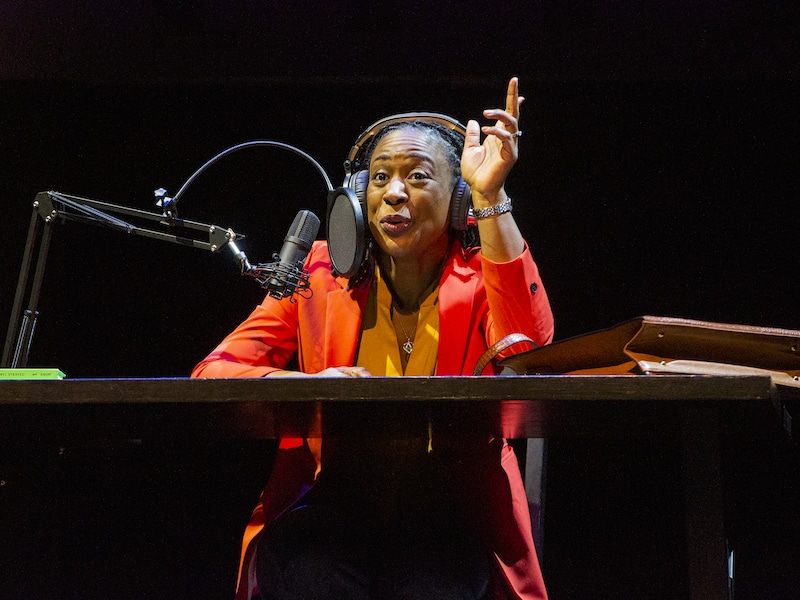There is nothing more universal about the human experience than wanting to be truly heard and understood, even if by only one person. And, if that person may offer some helpful advice, even better. But it is the listening, the acknowledgment, that is fundamental and that is so carefully explored in Tiny Beautiful Things at Baltimore Center Stage. Based on Cheryl Strayed’s advice column “Dear Sugar” and adapted for the stage by Nia Vardolos (My Big Fat Greek Wedding) and co-conceived by Marshall Heyman and Thomas Kail, the play is full of tiny beautiful things indeed but could use a little more cohesion.
The play has only the slightest of plots: A writer who is supposed to be finishing her book for publication takes on another writing task, becoming an unpaid (and untrained) advice columnist, a Dear Abby type for the 21st century. (Think more F-bombs and less purse-clutching over minor faux pas.)
That’s almost the whole story of the next 75 minutes.
A trio of letter writers — expertly played by Caro Dubberly, Evan Andrew Horowitz, and KenYatta Rogers connect with the advice columnist Sugar through their questions: Listen. I have a story to tell. And I need some advice. Through the problems they share, we encounter humanity in all its glory, complexity, and contradictions.
Dubberly, Horowitz, and Rogers are all very strong in their multifaceted roles, becoming the many letter writers through subtle costume changes (brown, tan, beige, and khaki outfits designed by Moyenda Kulemeka), a new posture, voice inflection, or accent change. They share the usual mundane conflicts of life; they tell outlandish stories of “crazy ex-girlfriends” or indulging in sexy Santa fantasies; they share heartbreaking tales of narcissistic fathers and the silent suffering of miscarriage. They raise the questions that many of us in the audience have had about ourselves and our relationships with others.

In one of the longest and later vignettes, Rogers beautifully becomes “Living Dead Dad,” a father who painfully and tearfully lists all the ways that the grief for his son is consuming his life. (In case this is not yet evident, the play deals with many difficult issues, including several descriptions of graphic sexual assault, child abuse, drug abuse, suicidal ideation, eating disorders, transphobia, and more.)
Sugar responds to their problems by creating deeply personal essays about her own varied life experiences, slowly winding a way back to the writers’ issues through self-reflection and interrogation. By revealing herself so intimately to others, she asks her readers to look deeper into themselves for their truths to guide themselves; to heal, grow, learn, do, become.

As Sugar, the always fantastic Erika Rose is a revelation. She beautifully approaches each response to a beleaguered writer in a different way, by turns becoming a caring maternal figure, a no-nonsense sassy best friend from a rom-com, a sidekick for fun shenanigans, and a sage philosopher. With her brilliant smile and radiance of warmth, Rose creates a trusting confidant in her depiction of Sugar, and with her “radical sincerity,” we want to heed her advice. She shares her own secrets with us, too, from the causes of her first failed marriage, to her brief but painful period of heroin abuse, to her ongoing love and grief for her mother, who died when both were still so young. Unlike Ann Landers or Miss Manners or some other almost ethereal, infallible advice-giver, Sugar is an openly flawed and complex woman, all the better to answer some of life’s thornier issues with honesty and authenticity.
After sharing so much of herself under her nom de plume for the literary website The Rumpus, New York Times bestselling author Cheryl Strayed (Wild, Torch, Brave Enough) announced herself as the columnist, eventually compiling the letters into the collection Tiny Beautiful Things (published in 2012). (In addition to this play, Tiny Beautiful Things is being released in April as a Hulu series starring Kathryn Hahn.)
Because of the formula of the advice column, we never see the successes or failures of the advice; the advice seekers only exist in a few brief moments, discussing their history and their current problems, but we never see a future for them. This epistolary framing makes for a challenge of creating flow and breaking monotony in what is essentially a series of monologues and dialogues. Director Ken-Matt Martin plays it a little too safely here, allowing the stories alone to create the conflict and characters, instead of playing with what could be more dynamic staging.

There is ample opportunity to think creatively about how to frame each new letter vignette. At times, this production does that deftly: Sim Carpenter’s scenic design with lighting by Sherrice Mojgani and sound by Jeff Gardner allows the set to replicate a computer’s motherboard showing the constant flood of incoming messages Sugar receives. At other times, the set quickly transforms into a café or a subway car — where each patron, barista, and rider becomes an advice seeker troubling Sugar with their problems.
In an especially inspired scene, an overwhelmed Sugar tries to wind down for the evening with a glass of wine and TV, but readers pop out of the fridge, sit at her table and on her sofa bombarding her with questions. However, many times readers just appear upstage on a series of raised platforms like a Greek chorus — distant and static — while our protagonist stands downstage engaging with the audience. And only once does Sugar — who so often shares that life and love is all about reaching out to others — actually reach out and embrace one of her readers. How can we make all of these experiences and stories meaningful onstage?
Tiny Beautiful Things is ultimately a touching and therapeutic study of humanity, generosity, and small gestures of connection and healing, but due to its epistolary form, it remains underwhelming as a dramatic work.
Running Time: Approximately 75 minutes, no intermission.
Tiny Beautiful Things plays through April 2, 2023, at Baltimore Center Stage – 700 North Calvert Street, Baltimore, MD. For tickets, call the box office at (410) 332-0033, or purchase them here.
The program for Tiny Beautiful Things is online here.
COVID Safety: Baltimore Center Stage’s current policy includes mask-optional performances on Thursdays, Saturday evenings, and Sunday matinees, and mask-required performances on Wednesdays, Fridays, and Saturday matinees. During those performances, masks may only be removed in designated eating and drinking areas. For more COVID-safety information, please visit here.




